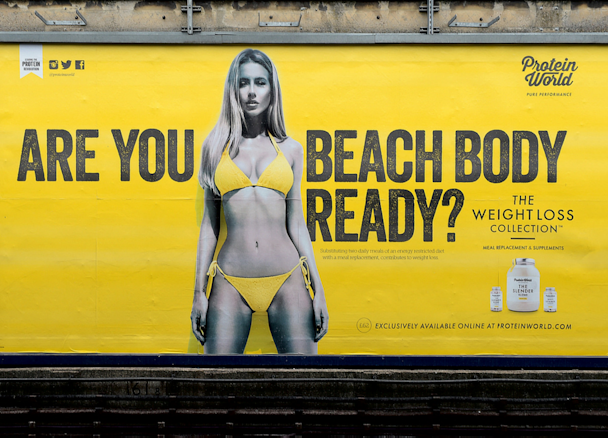Sadiq Khan's 'unrealistic body' ads ban nothing more than censorship – advertising’s loss will be PR’s gain
For two short years, before I wormed my way into PR, I worked as a personal trainer – and, slight dip since starting a business aside – still like to look after myself.

What does that have to do with anything? Well, some of you will have read that, from next month, London’s new mayor Sadiq Khan is moving to ban ads promoting an 'unhealthy' or 'unrealistic' body image from appearing on London's transport network – and I’d like to look at this logically, knowing what I know and having worked with hundreds of people of all shapes and sizes.
As per an election promise, Khan’s going to issue a total ban on ad campaigns that could "pressurise people" (don’t get me started on pressurise – since when was 'pressure' not good enough?) to conform to idealised body standards.
In his statement, Khan said that he was going after the kind of advertising that can demean people and make them feel ashamed of their bodies – noting, as the father of two teenage girls, that women were often particularly affected by this.
He went on to say that "nobody should feel" – *deep breath* – "pressurised into unrealistic expectations surrounding their bodies", adding that this ban was a clear message to the advertising industry.
There are three aspects I wanted to talk about, here.
1. I’ve seen people celebrating this as a success. It is anything but a success. It is blatant censorship in a bid to appease the loudest voices.
2. It is absolutely not unrealistic to attain the sort of bodies on show in advertising – and you know why? Because literally millions of people exist among us that look after their physique – not least the (usually) very real people that appear in these adverts. There’s absolutely nothing wrong with aspirational images.
3. Very often, the offended parties aren’t the target audience anyway; a marketing tactic brands like Paddy Power, BrewDog and Ryanair have used constantly to court controversy.
Digitally enhanced or manipulated images are an issue that blights my second point above, necessitating why I had to say usually. As time’s gone on, though, and we’ve got wiser to it, we’re able to both call it out and point and laugh at it, like the recent example of a Fifth Harmony member’s two right feet and ‘Photoshop body fails’ compilations we’ve all seen.
Brands have been joining the fray for years, too. Just a few weeks ago, clothing retailer American Eagle announced record lingerie sales since publicly doing away with retouching models, while Dove was quick to notice the ill-feeling towards the trend of runway-slim models being used and/or digitally developed in advertising back in 2004. Its 'Real Beauty' campaign highlighted the issue, won it plaudits and increased sales in its first six months by 700 per cent. Surely there’s no better incentive for brands to carefully consider their ads than increased revenue?
My fundamental problem with censorship is that it aims to stamp out reasonable debate and choice. The same kind of thought and word policing by those celebrating this has led to a society of silenced and disenfranchised people. There’s a reason 'shy Tories' exist and voted in this current government, contrary to what you’d have assumed as a social media user. I’d much sooner have a conversation, do something positive, or live and let live than censor to appease those that shout the loudest.
The 'body shaming' ad most commonly cited is Protein World’s now-infamous 'Are you beach body ready?' tube effort from 2015, pictured top. The phrasing provoked a predictably hostile reaction (to Protein World’s glee and possible intent), but to say that the ad promotes an 'unhealthy' or 'unrealistic' body image is ridiculous. The ad’s model, Renee Somerfield is, again, very real and does indeed look like that. The makers of the ad insist it was digitally untouched and it doesn’t appear to have been.
I wonder if the same people celebrating the mayor’s decision have complained about the Diet Coke man, Old Spice’s pitchman of yesteryear Isaiah Mustafa or David Beckham’s underwear ads for H&M as examples of 'unrealistic' body image promotion? I’m not one for building straw…people, but I’d hazard a guess at 'probably not'. You might well have even seen the same people ogling over these and other similar ads complain about body shaming. It’s all a matter of intended audience as per point three above – those ads took advantage of good-looking men to achieve marketing aims, while a shirtless model likely isn’t necessary for PG Tips to achieve its own.
Looking for the silver lining here as an agency owner, advertising income for TfL totals £1.5bn, meaning these brands have budget to spend. Khan must know that paid media, which apparently goes to improving transport infrastructure and subsidising commuter costs, isn’t the only game in town. With earned, social and other owned channels providing a route to an audience, advertising’s loss at the hands of mollycoddling, vote-winning and pretending such 'unrealistic' bodies don’t exist could well be PR’s gain.
Rich Leigh is founder of Rich Leigh and Co. He tweets @RichLeighPR
